|
|
|
Sort Order |
|
|
|
Items / Page
|
|
|
|
|
|
|
| Srl | Item |
| 1 |
ID:
136607


|
|
|
|
|
| Summary/Abstract |
Even though democracies by and large share the perception of Iran as a threat to peace and security, they disagree over the appropriate policy response. This paper examines why some democracies prefer accommodation while others plead for confrontation. Using a new data set on democracies' policies toward Iran in the 2000s, we assess the impact of power positions, commercial interests, and domestic political cultures while controlling for government ideology. While we find little support for any impact of power positions, “cultures of dealing with deviance,” that is, the discourses and practices of dealing with violations of norms domestically as institutionalized in a society's criminal law and justice system, have a substantial and statistically significant effect on state policies. Finally, we find qualified support for commercial liberalism: Whereas high levels of total trade do not have the expected effect of making states more accommodationist, high levels of trade in strategic goods such as oil do.
|
|
|
|
|
|
|
|
|
|
|
|
|
|
|
|
| 2 |
ID:
136664


|
|
|
|
|
| Summary/Abstract |
This article examines how the Association of Southeast Asian Nations (ASEAN) conflict management process in the South China Sea (SCS) has been conducted and whether the ASEAN way can effectively manage the dispute, in which China is a prime and important actor. It argues that rising tensions in the South China Sea are a direct result of the changed balance of power in the region given the asymmetry between China and ASEAN members. China has taken advantage of ASEAN efforts to develop a code of conduct that is premised on the ASEAN way.
Introduction
|
|
|
|
|
|
|
|
|
|
|
|
|
|
|
|
| 3 |
ID:
135431
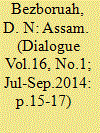

|
|
|
|
|
| Summary/Abstract |
One does not come to such damning conclusions flippantly or in haste. After all, to say that I live in a failed State constitutes a condemnation of myself as well since I am part of a so-called democratic system. But I have discussed the matter with a whole lot of people from different walks of life and they all agree that what we have of Assam today is just a failed State. A State or a country fails not just because the
government has failed but rather because the people have failed themselves and their State or country. Quite obviously, the government must take the bulk of the responsibility for a failed State because all
power is concentrated in the government in our brand of democracy. So when a State gets to be viewed as a failed State the government, and those who run it but fail to ensure good governance, must take the
major share of blame. But the people too cannot escape responsibility for a failed State. I shall come to the issue of how the people fail their State and thereby fail themselves, but it is important to begin at the
beginning.
|
|
|
|
|
|
|
|
|
|
|
|
|
|
|
|
| 4 |
ID:
135648


|
|
|
|
|
| Summary/Abstract |
First it was Syria, now Iraq and the creation of a Caliphate incorporating parts of Syria and Iraq by ISIS (now simply IS) that will take the West’s eye further off Afghanistan a second time. Earlier, American President Barack Obama’s stunning political statement fixing the deadline for final troop withdrawal from Afghanistan as end-2016, not as widely believed, 2025, contingent upon the signing of the Bilateral Security Agreement was psychologically a negative development. Obama has outlined a new strategy for a new coalition of the willing that will attempt to roll back IS over the next three years. Precious resources will be diverted to fight the new war against the most extreme and violent form of terrorism that has attracted nearly 15,000 foreign Muslim youth.
|
|
|
|
|
|
|
|
|
|
|
|
|
|
|
|
| 5 |
ID:
135954


|
|
|
|
|
| Summary/Abstract |
While United Nations peacekeeping missions were created to keep peace and perform post-conflict activities, since the end of the Cold War peacekeepers are more often deployed to active conflicts. Yet, we know little about their ability to manage ongoing violence. This article provides the first broad empirical examination of UN peacekeeping effectiveness in reducing battlefield violence in civil wars. We analyze how the number of UN peacekeeping personnel deployed influences the amount of battlefield deaths in all civil wars in Africa from 1992 to 2011. The analyses show that increasing numbers of armed military troops are associated with reduced battlefield deaths, while police and observers are not. Considering that the UN is often criticized for ineffectiveness, these results have important implications: if appropriately composed, UN peacekeeping missions reduce violent conflict.
|
|
|
|
|
|
|
|
|
|
|
|
|
|
|
|
| 6 |
ID:
135895


|
|
|
|
|
| Summary/Abstract |
Leaders remain subject to the same biological determinants and pressures that affect other humans. Yet, they also differ in their ability to regulate and marshal their emotions just as they diverge in their other skills, talents, limitations, and abilities. In particular, some are better at channeling their emotions to help shape foreign policy more efficiently than others. One of the most potent and powerful emotions with which leaders have to contend, particularly under conditions of provocation, is anger. Anger can influence judgment and decision making in systematic and predictable ways. Individual heritable differences can influence the conditions under which anger leads to aggressive action. Such differences can influence not only the environments into which leaders select, but also the ways they process and interpret information; these determinations can decisively influence the outcome of significant public policies, including decisions on conflict and war. As a result, emotion regulation can play a strategic role in leadership. Examples from several recent presidencies illustrate how such individual differences play out on the world stage.
|
|
|
|
|
|
|
|
|
|
|
|
|
|
|
|
| 7 |
ID:
136117


|
|
|
|
|
| Summary/Abstract |
Although it has been clearly established that collective memory is a potential source of ethnic conflicts, it remains to clearly formulate the causal pattern under which the past becomes an agent of action. Following Arthur Stinthcombe's differentiation between “historical causes” and “constant causes,” this article analyzes collective memory in the Belgian case as a “constant cause.” In Belgium, the community conflict surrounding the increasing autonomy of Flanders and Wallonia is characterized by discourses featuring various historical representations of linguistic grievances. Analysis suggests that these representations, estimated to be the mainspring of Flemish autonomist claims, are mobilized under a causal pattern of symbolic reactivation and cognitive continuance of past linguistic injustices.
|
|
|
|
|
|
|
|
|
|
|
|
|
|
|
|
| 8 |
ID:
136328


|
|
|
|
|
| Summary/Abstract |
The Asia-Pacific region has evolved in to a main battlefield of international strategic rivalry. Tensions are escalating in China’s surrounding areas. China should strike a dynamics balance between defending its legitimate rights and ensuring regional stability by seizing the strategic initiative in managing crises and conflicts on the basis of stabilizing foreign relations and pressing on with international cooperation.
|
|
|
|
|
|
|
|
|
|
|
|
|
|
|
|
| 9 |
ID:
136218
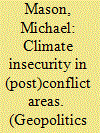

|
|
|
|
|
| Summary/Abstract |
Within the United Nations, the United Nations Development Programme, United Nations Environment Programme and Office for the Coordination of Humanitarian Affairs have all highlighted climate risks as relevant to their work in areas affected by conflict, endorsing human security approaches as valid for mapping the relationships between climate stresses and conflict-related harm. While this policy interest has limited operational presence, I discuss salient assessments of climate vulnerability in (post)conflict areas, arguing that these agencies have applied a natural disaster rather than conflict regulation inflection of humanitarian reason. The former entails a biopolitical paradigm of disaster risk reduction, prescribing technical-managerial measures to build the resilience of vulnerable populations. This framing supports a depoliticised stance reflecting UN norms of neutrality and impartiality. I claim that this position nevertheless disregards its own geopolitical conditions and effects, which dilute the scope for international humanitarian law to assign responsibility for conflict-related harm.
|
|
|
|
|
|
|
|
|
|
|
|
|
|
|
|
| 10 |
ID:
136552


|
|
|
|
|
| Summary/Abstract |
India and Pakistan were born into conflict in 1947 and their relationship has been among the world’s enduring rivalries ever since. In this historical context, the modest signs of progress since the resumed dialogue in February 2011 are of significance. How can these improved prospects for a more peaceful relation between Pakistan and India be explained? Departing from Liberal peace theory, this study develops an explanatory framework and investigates the impact of trade on dyadic peace processes. The empirical findings indicate that trade expectations indeed could have facilitated for a resumed dialogue between India and Pakistan. Future research may be able to attain more robust results through further specifications of the explanatory framework and additional empirical analysis.
|
|
|
|
|
|
|
|
|
|
|
|
|
|
|
|
| 11 |
ID:
135364
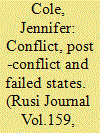

|
|
|
|
|
| Summary/Abstract |
The current outbreak of ebola in West Africa has been widely covered in the global media, as the latest example of a health epidemic that can quickly spread across and beyond countries. While drugs development is needed to counter the virus, Jennifer Cole argues that any successful long-term approach to fighting epidemics must be based on a deeper socio-cultural understanding of the dynamics that underpin fragile healthcare systems.
|
|
|
|
|
|
|
|
|
|
|
|
|
|
|
|
| 12 |
ID:
134462
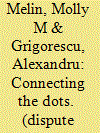

|
|
|
|
|
| Summary/Abstract |
We explore states’ decisions to escalate disputes over their territorial claims or settle them peacefully. We complement existing arguments by accounting for the fact that states are often simultaneously entangled in multiple territorial claims. We build on previous scholarship in positing that two states involved in a territorial dispute will act based on information they glean from each other’s reputation for dealing with claims with other states and their recent actions involving disputes with other states. Because states know that their actions will impact their adversaries’ calculations, the existence of multiple ongoing territorial claims will act as a deterrent from any type of action to resolve the dispute, whether militarized or peaceful. Our hypotheses therefore consider the impact of the number of states’ other territorial claims as well as the number of their adversaries’ claims. Tests using the Issue Correlates of War data support our arguments.
|
|
|
|
|
|
|
|
|
|
|
|
|
|
|
|
| 13 |
ID:
134546
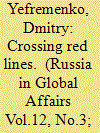

|
|
|
|
|
| Summary/Abstract |
The Ukrainian crisis is just ushering in a series of conflicts amid which a polycentric system of international relations will form. An effective multilateral mechanism must be created for preventing and settling crises in Europe and North Eurasia.
|
|
|
|
|
|
|
|
|
|
|
|
|
|
|
|
| 14 |
ID:
136963


|
|
|
|
|
| Summary/Abstract |
This special edition is the product of the 16th Annual International Conference on Economics and Security, held at the American University in Cairo, Egypt, 21–22 June 2012. The conference was organized by the Department of Public Policy and Administration, American University in Cairo, Economists for Peace and Security (Egypt), Economists for Peace and Security (UK), Economists for Peace and Security (US), and the School of Global Affairs at the American University in Cairo. The conference addressed a trajectory of current issues pertaining to the region and across the globe, ranging from applied to theoretical. The conference participants are policy scientists and researchers from different academic institutions and parts of the world, including Egypt, the UK, Greece, the USA, Sweden, China, Turkey, Italy, Germany, South Africa, the Netherlands, Portugal, Switzerland, and Spain.
|
|
|
|
|
|
|
|
|
|
|
|
|
|
|
|
| 15 |
ID:
136649


|
|
|
|
|
| Summary/Abstract |
This article addresses the question of why regional cooperation among Afghanistan’s neighbours has been so difficult despite these countries’ common concerns. To answer this question, Afghanistan is conceptualised as placed at the core of overlapping regions: South Asia, the Middle East, Central Asia and, through China’s influence, East Asia. Over the past decade, interactions among different regions ‘through’ Afghanistan have increased, and overlap has intensified. Each of these regions is characterised by more or less intense balance-of-power security dynamics, which have played out in Afghanistan. The fact that the regions that overlap in Afghanistan are predominantly characterised by patterns of conflict helps to explain the difficulties of regional cooperation
|
|
|
|
|
|
|
|
|
|
|
|
|
|
|
|
| 16 |
ID:
137114
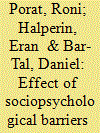

|
|
|
|
|
| Summary/Abstract |
During protracted intractable conflicts, society members develop a sociopsychological infrastructure that leads to selective and biased information processing, obstructing the penetration of new information that may facilitate peacemaking. To validate a process model that depicts the functioning of these barriers, we conducted a study among 207 Israeli Jews, focusing on the effects of long-term barriers on information processing. After measuring these barriers, we introduced an invented peace proposal and gave participants the option of processing additional information concerning its implications using the Decision Board Platform. Aided by this platform, we conducted an in-depth analysis of information acquisition strategies and found that four general worldviews (i.e., traditional and universal values, incremental theory, and authoritarianism) were associated with the ethos of conflict, which in turn was associated with the general amount and type of information processed. The theoretical and applied implications are discussed.
|
|
|
|
|
|
|
|
|
|
|
|
|
|
|
|
| 17 |
ID:
134588
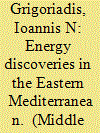

|
|
|
|
|
| Summary/Abstract |
The discovery of oil and natural-gas reserves in the Middle East at the beginning of the twentieth century changed the fate of the region. From a backwater of international politics, the Middle East became central to international strategic rivalries. Almost a century later, energy discoveries in the Eastern Mediterranean are unlikely to bring about such tectonic shifts in the strategic fortunes of the Levant. Yet they have generated a fresh interest in their potential impact on existing regional disputes and power constellations.
|
|
|
|
|
|
|
|
|
|
|
|
|
|
|
|
| 18 |
ID:
136094


|
|
|
|
|
| Summary/Abstract |
A large literature demonstrates that civil war is recurrent: States that have already experienced such conflict tend to relapse back into war. How might this ‘conflict trap’ be escaped? We answer this question with a focus on gender. Women tend to exist at the margins of society, and postwar society often perpetuates prewar values. Yet this continuity is not inevitable. We argue that the end of a civil war opens a window of opportunity through which women may increasingly participate in society, economics, and politics. Given women's preference for peace and aversion to political violence, we expect this increased participation to reduce the risk of relapse to civil war. Large-N analyses support our argument, and in particular suggest that increases in female literacy and parliamentary representation reduce the risk of relapse.
|
|
|
|
|
|
|
|
|
|
|
|
|
|
|
|
| 19 |
ID:
135747


|
|
|
|
|
| Summary/Abstract |
Extreme environmental events over the past decade have highlighted the threat these pose to security, and their links to conflict and civil unrest. Jeffrey Mazo explores the dynamics at work and the potential ramifications of these unpredictable hazards.
|
|
|
|
|
|
|
|
|
|
|
|
|
|
|
|
| 20 |
ID:
136891
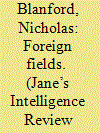

|
|
|
|
|
| Summary/Abstract |
Hizbullah’s operations across Syrian battlefronts continued in early 2015, playing a major role in supporting the governments. Nicholas Blanford examines the group’s involvement in Syria and how its combat experience could be relevant in a future conflict with Israel.
|
|
|
|
|
|
|
|
|
|
|
|
|
|
|
|
|
|
|
|
|